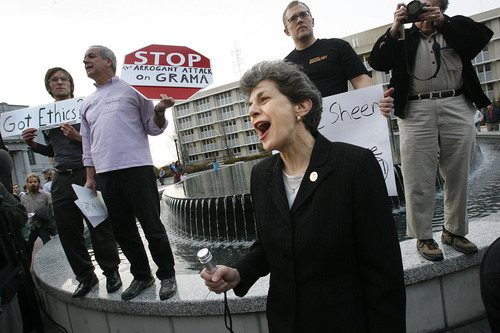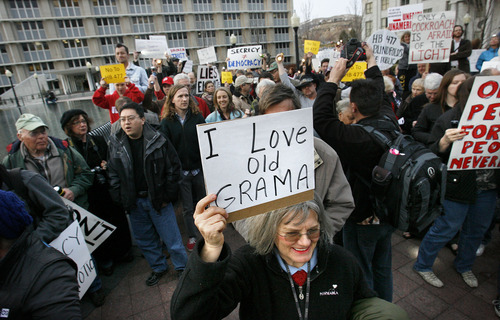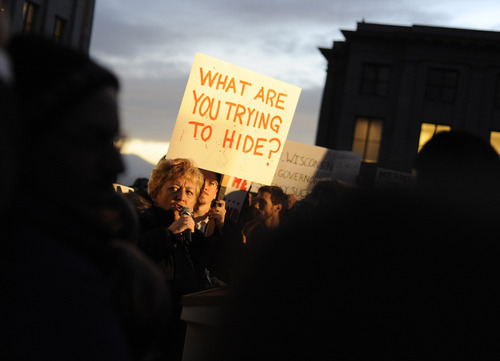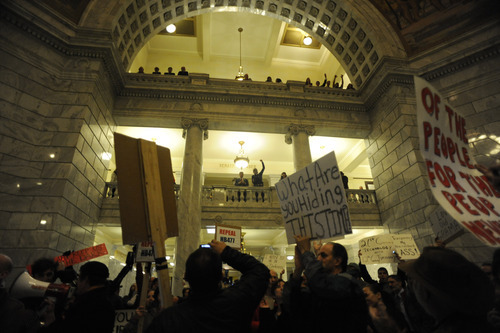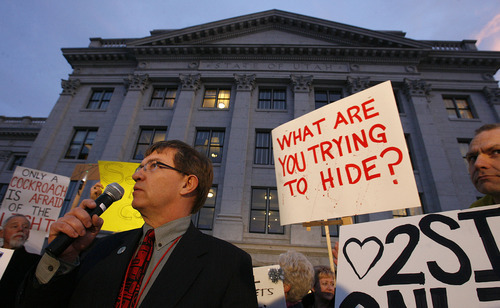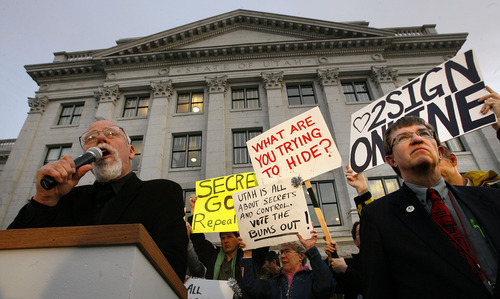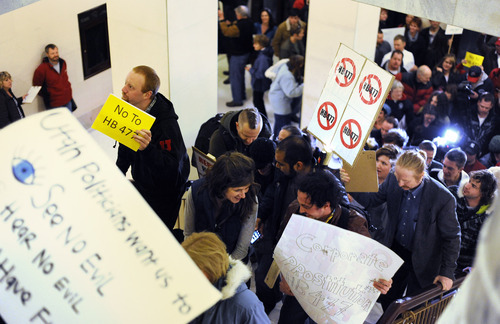This is an archived article that was published on sltrib.com in 2011, and information in the article may be outdated. It is provided only for personal research purposes and may not be reprinted.
Protesters rushed the Capitol on Thursday night in opposition to an open-records law that would shield some government correspondence from the public.
Among the crowd: environmental activist Tim DeChristopher, who was convicted last week of two felonies for monkey-wrenching a federal oil and gas lease auction.
More than 200 flashlight-waving protesters entered the Capitol after an outdoor rally, beating drums, chanting and singing as they called for repeal of HB477, a new law restricting access to public records.
They filled the balconies around the Rotunda. Some attempted to enter the House floor, but were turned away by security guards. Others entered the House visitor galleries — relatively quietly —holding protest signs. Security guards locked the doors to the Senate, which was in recess at the time.
Protesters in the hallways made a racket, chanting "repeal" and "our house." They also sang verse after verse of "I'm going to let it shine."
After several choruses, Rep. Patrice Arent, D-Millcreek, held up a hastily made sign that said, "We voted no." She quickly was joined by Rep. Jennifer Seelig, D-Salt Lake City, and other Democratic lawmakers.
The crowd in the balcony erupted in cheers.
Before the protesters decided to storm "the people's house," they rallied for an hour outside the Capitol, chanting "vote them out, vote them out."
"We are here tonight to shine light on the darkness," the Rev. Tom Goldsmith, of Salt Lake City's First Unitarian Church, told the crowd as the sun was setting at the Capitol. "We are going to keep shining the light until our legislators are accountable to us."
Protesters criticized restrictions that HB477 places on the state's open-records law, known as the Government Records Access and Management Act (GRAMA). The Legislature passed it 72 hours after unveiling it last week, saying it is needed to stop fishing expeditions by the news media to embarrass lawmakers.
Under threat of veto by Gov. Gary Herbert, lawmakers delayed its effective date until July 1 to allow possible improvements during a June special session. Then Herbert signed the bill.
"It's awful that Herbert didn't stand up more," said Megan Sanders, a journalist with Fox 13.
Her 2-year-old daughter, Scarlett Solomon, was sitting in a stroller, waving a flashlight and holding a sign that said, "Governor, it isn't nice to gut your GRAMA."
Scarlett kept repeating a new word she learned from the crowd, "Transparency, transparency."
The crowd heard from a broad spectrum of speakers, including Cherise Udell, a rally organizer with Utah Moms for Clean Air. She told the crowd that she talked to environmental organizations, hunting groups and others on both sides of the political aisle and found none that backed HB477.
"So who are our elected officials representing? It's not us," she said to cheers.
Matt Pacenza, with the Healthy Environment Alliance of Utah, said, "government works best when citizens and the press keep a close eye on it."
Tom Haraldson, president of the Utah Society of Professional Journalists, said GRAMA "is a law to protect every one of us, not just the press."
He said the national Society of Professional Journalists says Utah now has a weaker open-records law than many Third World nations.
Rep. Rebecca Chavez-Houck, D-Salt Lake City, urged protesters to keep up pressure in coming months.
"Stay diligent. Stay persistent" or, she said, needed change will not come.
Some groups are not waiting for the Legislature to change the bill. One group filed the first referendum petition Thursday seeking to repeal HB477.
David Montero and Judy Fahys contributed to this report


